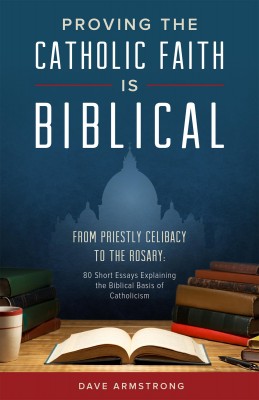Editor's Note: This is an excerpt from Dave Armstrong's book Proving the Catholic Faith is Biblical, newly published by Sophia Institute Press and is reprinted by permission of the publisher. The book is a collection of 80 essays that explain the Biblical truth behind many Catholic beliefs and practices.--Barb
Are there explicit, “direct” proofs of the Immaculate Conception of the Blessed Virgin Mary in the Bible? No. Does the Bible ever teach that all doctrines must be explicitly contained in it? No. Is this doctrine harmonious with what is in Scripture and supported by analogy and plausibility? Yes.
Luke 1:28: And he came to her and said, “Hail, O favored one, the Lord is with you!” [In the RSV, Catholic edition, “favored one” is rendered as “full of grace.”]
Many translations use “favor” here, yet even the great Baptist Greek scholar A. T. Robertson1 agrees that the word involved (kecharitomene) means “full of grace which thou hast received.” It’s derived from the Greek root charis (grace). Presbyterian Greek scholar Marvin R. Vincent agrees that it means “endued with grace.”2
Now, a Catholic asks, “What does it mean to be full of grace?” For St. Paul, grace is the antithesis and overcomer of sin:
Romans 6:14, 19, 22: For sin will have no dominion over you, since you are not under law but under grace . . . so now yield your members to righteousness for sanctification. . . . But now that you have been set free from sin . . . the return you get is sanctification and its end, eternal life.
Moreover, we are saved by grace:
Ephesians 2:8: For by grace you have been saved through faith; and this is not your own doing, it is the gift of God. (cf. Acts 15:11; Rom. 3:24; Titus 2:11; 3:7)
It follows, I submit, that for a person to be full of grace is to both be saved and to be exceptionally, completely holy. Therefore, Mary is holy and sinless. The essence of the Immaculate Conception is sinlessness, and this is deduced from many biblical passages about the antithetical relation of grace to sin, and salvation and its accompanying sanctification to sin.
The only remaining question is: When did God apply this grace to Mary? We know she possessed it as a young woman, at the Annunciation. Catholics believe that God gave her the grace at her conception so as to avoid the Original Sin that she inevitably would have inherited, being human, but for God’s preventive grace, which saved her from falling into the pit of sin.
But do we ever observe in the Bible, persons being extraordinarily sanctified, even before their birth, as we believe Mary was? Yes, we do; for example, the prophets Isaiah and Jeremiah:
Isaiah 49:1, 5: The Lord called me from the womb. . . . And now the LorD says, who formed me from the womb to be his servant, to bring Jacob back to him, and that Israel might be gathered to him, for I am honored in the eyes of the LorD. (cf. Job 31:15, 18; Judges 16:17)
Jeremiah 1:5: Before I formed you in the womb I knew you, and before you were born I consecrated you; I appointed you a prophet to the nations. (cf. Sir. 49:7)
“Consecrated” or “sanctified” (KJV) in Jeremiah 1:5 is the Hebrew word quadash (Strong’s word no. 6942). According to Ge-senius’s Hebrew-Chaldee Lexicon of the Old Testament (p. 725), in this instance it meant “to declare any one holy.” Jeremiah was thus consecrated or sanctified from the womb; possibly from conception. This is fairly analogous to the doctrine of the Immaculate Conception. We know Jeremiah was a very holy man. Was he sinless, though? Perhaps he was. We also have New Testament evidence of such sanctification before birth (John the Baptist and St. Paul):
Luke 1:15: [F]or he will be great before the Lord, and he shall drink no wine nor strong drink, and he will be filled with the Holy Spirit, even from his mother’s womb. (cf. Luke 1:41, 44)
Galatians 1:15: he who had set me apart before I was born, and had called me through his grace.
We know that John the Baptist was also a very holy man. Was he sinless? We can’t know that for sure from the biblical data. St. Catherine of Siena, for one, believed that he never sinned (A Treatise of Prayer). But we do know for sure that he was sanctified from the womb.
Therefore, by analogy and plausibility, we can and may conclude that it is “biblical” to believe in faith that Mary was immaculately conceived. Nothing in the Bible contradicts this belief. It does require faith, of course. God restored to Mary the innocence that Eve had before the Fall and filled her with grace in order to prepare her for her unspeakably sublime, sanctified task as the Mother of God the Son. Why should He not do so?
Resources
1 A. T. Robertson, Word Pictures in the New Testament (Nashville: Broadman Press, 1930), vol. 2, 13.
2 Word Studies in the New Testament, vol. 1, 259.
About the author
Dave Armstrong has been defending Christianity since 1981, and Catholicism since 1990. He has authored 49 books, and has over 1500 posts available at Patheos, and his website, Biblical Evidence for Catholicism. He's published with The Catholic Answer, Envoy Magazine, and Catholic Answers Magazine, and has been interviewed on national radio, including Catholic Answers Live and Kresta in the Afternoon. He and his wife of 31 years live with their four children in Michigan.
When you purchase this book through the affiliate link in this post, you support the work we do at CatholicMom.com at no extra cost to you!
About the Author

Guest
We welcome guest contributors who graciously volunteer their writing for our readers. Please support our guest writers by visiting their sites, purchasing their work, and leaving comments to thank them for sharing their gifts here on CatholicMom.com. To inquire about serving as a guest contributor, contact editor@CatholicMom.com.




.png?width=1806&height=731&name=CatholicMom_hcfm_logo1_pos_871c_2728c%20(002).png)
Comments